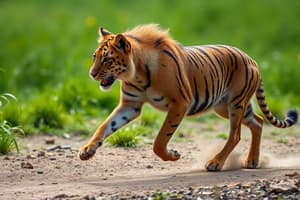Podcast
Questions and Answers
What term describes the biological patterns of behavior that are innate and determined by genetics?
What term describes the biological patterns of behavior that are innate and determined by genetics?
- Needs
- Incentives
- Drives
- Instincts (correct)
According to Drive Reduction Theory, what causes internal drives to push an organism to satisfy needs?
According to Drive Reduction Theory, what causes internal drives to push an organism to satisfy needs?
- Environmental incentives
- Social pressures
- Physiological needs (correct)
- Cognitive beliefs
What type of drive is learned through experience or conditioning?
What type of drive is learned through experience or conditioning?
- Primary drives
- Secondary drives (correct)
- Instinctual drives
- Innate drives
Which hormone is primarily involved in signaling hunger?
Which hormone is primarily involved in signaling hunger?
What component of the hypothalamus is responsible for signaling satiety?
What component of the hypothalamus is responsible for signaling satiety?
What does the concept of homeostasis refer to in relation to bodily needs?
What does the concept of homeostasis refer to in relation to bodily needs?
What is the primary goal of adaptive theory in relation to sleep?
What is the primary goal of adaptive theory in relation to sleep?
What motivates people to engage in behavior according to incentive theory?
What motivates people to engage in behavior according to incentive theory?
What is intrinsic motivation primarily based on?
What is intrinsic motivation primarily based on?
Which of the following is one of the psychological needs proposed by McClelland?
Which of the following is one of the psychological needs proposed by McClelland?
According to Maslow’s Hierarchy of Needs, what is the ultimate goal individuals strive to achieve?
According to Maslow’s Hierarchy of Needs, what is the ultimate goal individuals strive to achieve?
What is a key limitation of Maslow's theory highlighted in the content?
What is a key limitation of Maslow's theory highlighted in the content?
How does Carol Dweck's Self-Theory of Motivation relate to achievement?
How does Carol Dweck's Self-Theory of Motivation relate to achievement?
Flashcards are hidden until you start studying
Study Notes
Motivation Definition
- The process that propels and sustains activity.
- Derived from the Latin word "movere," meaning "to move."
What Motivates Behavior
- Instincts: Biologically determined and innate patterns of behavior.
- Needs: Requirements of material essential for survival of the organism.
- Drives: The desire to reduce unpleasant arousal states resulting from basic physiological needs.
- Incentives: Any rewarding condition that provides a motive for behavior.
Drive Reduction Theory
- Assumes behavior arises from physiological needs.
- Needs cause internal drives to push the organism to satisfy the need.
- Reduces tension and arousal.
Primary and Secondary Drives
- Primary: Involve needs of the body (e.g., hunger, thirst).
- Secondary: Learned through experience or conditioning (e.g., money, social approval).
Homeostasis
- The tendency of the body to maintain a steady state.
- A negative-feedback model of homeostasis helps regulate body functions.
Why Do We Eat?
- Physiological component:
- Ventromedial hypothalamus: Signals satiety (fullness).
- Lateral hypothalamus: Signals hunger.
- Hormonal activity:
- Insulin: Regulates blood sugar levels.
- Ghrelin: Stimulates hunger.
- Leptin: Signals satiety.
- Social factors: People eat even when not hungry due to social cues.
Why Do We Sleep?
- Adaptive theory: Sleep for survival.
- Restorative theory: Sleep for physical health and memory consolidation.
Stages of Sleep
- Rapid eye movement (REM): Characterized by dreams.
- NREM (non-REM) sleep: Several stages without rapid eye movements.
Incentive Theory
- People are motivated by external goals, rather than just fulfilling basic needs.
Intrinsic vs. Extrinsic Motivation
- Intrinsic: The act itself is enjoyable and rewarding.
- Extrinsic: Motivation comes from an external reward (e.g., money, grades).
McClelland's Theory
- Proposes that people have psychological needs that motivate behavior.
- These needs vary in strength between individuals.
- McClelland identified three key psychological needs:
- Need for Affiliation (nAff): Desire for belonging and social connection.
- Need for Power (nPow): Desire for control and influence.
- Need for Achievement (nAch): Desire for accomplishment and success.
Carol Dweck's Self-Theory of Motivation
- Need for achievement is linked to personality factors, including one's view of self.
- Locus of control: Belief in internal or external control over outcomes.
Abraham Maslow and the Hierarchy of Needs
- Humanistic approach to psychology.
- Focus on human potential and fulfilling it.
- Proposed a hierarchy of needs, with basic needs at the bottom:
- Physiological needs (e.g., food, water, shelter).
- Safety needs (e.g., security, stability).
- Belongingness and love needs (e.g., social connection, affection).
- Esteem needs (e.g., self-worth, respect from others).
- Self-actualization needs (e.g., achieving full potential).
Self-Actualization
- People who have fulfilled their lower needs and reached their full potential.
Peak Experiences
- Moments of temporary self-actualization in a person's life.
Limitations to Maslow's Theory
- Based on observations, not empirical research.
- Exceptions exist to the hierarchical order of needs.
Studying That Suits You
Use AI to generate personalized quizzes and flashcards to suit your learning preferences.




